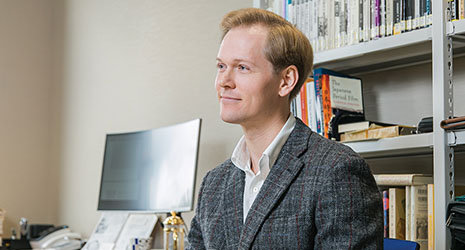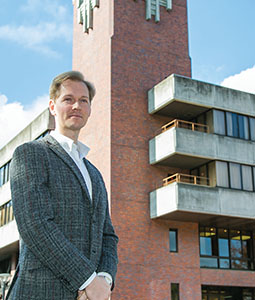Home > Highlighting JAPAN > Highlighting Japan February 2019 > My Way
Highlighting JAPAN


A Swedish Researcher Passionate About Japanese Cinema
Stockholm native Johan Nordström, who first came to Japan in 2001, currently lectures on Japanese film history at Tsuru University’s Department of Global Education and also promotes contemporary Japanese films as a curator at international film festivals.
Johan Nordström’s research focuses on prewar Japanese films and modernism in popular culture. A native of Stockholm in Sweden, Nordström grew up familiarizing himself with Japanese culture, influenced by his author father. He started watching Japanese anime and films at a very young age, and began reading translated works of great Japanese authors such as Naoya Shiga, Junichiro Tanizaki and Yukio Mishima. “I was watching Kurosawa’s period films and seventies anime, such as Galaxy Express 999 and Space Battleship Yamato. I was the type of teenager who was infatuated with Kinkakuji by Yukio Mishima, even calling it one of the world’s best novels,” Nordström laughs.
In 2001, while majoring in Japanese at Stockholm University, Nordström fulfilled a long-cherished dream of visiting Japan through a short study-abroad program. This strengthened his ambition to study Japanese films in the Japanese language, which led him to complete his Ph.D. at Waseda University’s Department of Theatre and Film Arts at the School of Humanities and Social Sciences in Tokyo. He then worked as a postdoctoral researcher at Meiji Gakuin University, funded by the Japan Society for the Promotion of Science. He now teaches at Tsuru University near Mount Fuji.
Since 2010, Nordström also regularly curates international film festivals, often in collaboration with the National Film Archive of Japan. He has helped organize international film festivals showing Japanese films—such as masterpieces of silent cinema, early sound cinema from the 1930s, Japanese color cinema from the 1950s and anime—at overseas museums, including the Museum of Modern Art in New York. “I’m very glad the Japanese government cares for the country’s film culture and supports activities to preserve it,” says Nordström. “Films visualize culture, and they become a good entrance point for the world to better understand Japan.”
He says that people have always treated him with warmth and kindness in Japan. “Just like Sweden, Japan is a safe and comfortable country to live in. As long as you behave in accordance with Japanese customs, they welcome you with open arms and make you feel you are part of the local community. And Swedish people are generally inclined to follow the proverb, ‘When in Rome, do as the Romans do,’ ” Nordström adds in fluent Japanese.
A concern for family-oriented Nordström is that he has little time to spend with his parents in Sweden. “I chose an academic job partly because it has long holidays,” he notes. “It allows me to spend a month back in Sweden every summer and take a break at the end of year.”
Sweden and Japan are both aging societies. “As a welfare state, Sweden may be ahead in the availability of elder care facilities and systems,” Nordström shares. “However, when possible, I believe it’s preferable for family to take care of their aging parents. I often see elderly people in Japan living with their families and being warmly cared for. I find that spirit of filial piety beautiful, and am happy to see it is alive and well.” Besides family bonds, he’s impressed with the courtesy and strong ties that exist between senior and junior students and colleagues, as well as teachers and students in different communities.
Nordström is working on a book based on his doctoral dissertation, which will focus on early talkies and how the Japanese film industry changed during its transition to sound in the 1930s. “I hope to publish my book through a Japanese publisher, and to continue introducing Japanese film culture abroad,” says Nordström.
The beauty of traditional houses and nature also fascinates him. “I’m thinking of purchasing an old folk house away from Tokyo and renovating it to live there.” It’s clear that even outside the world of film, Nordström enjoys living in Japan to the fullest.
© 2009 Cabinet Office, Government of Japan







